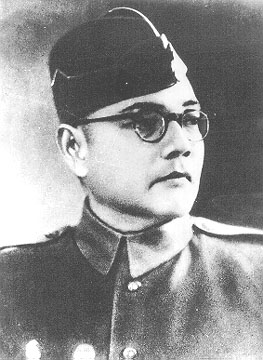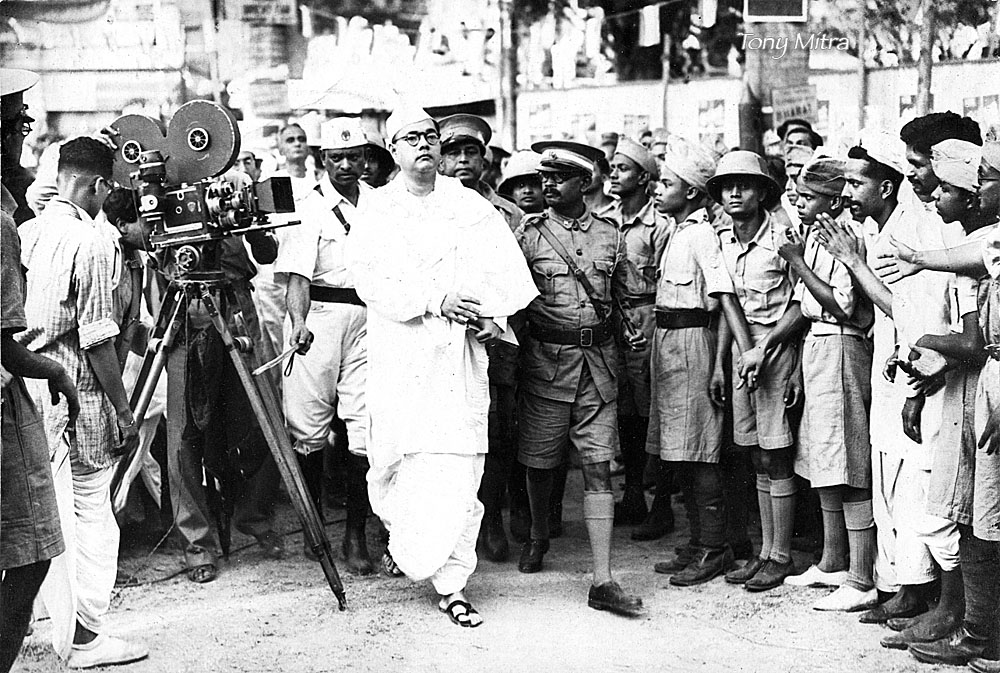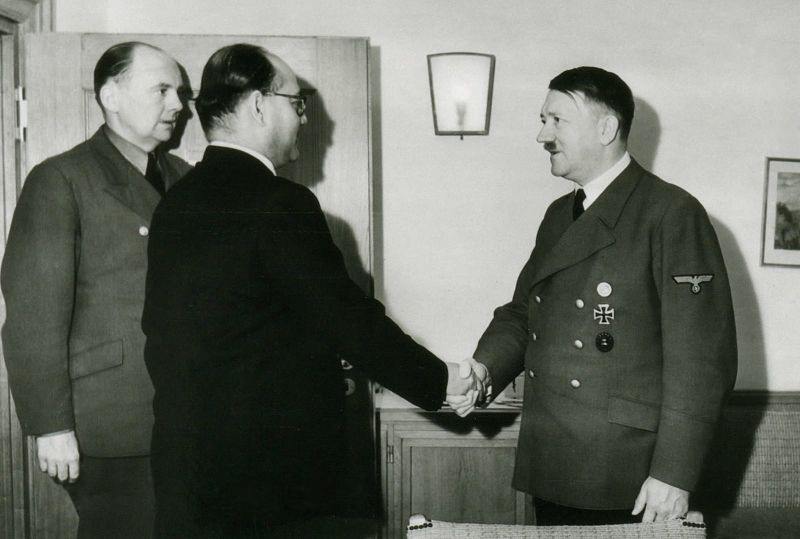
Subhas Chandra Bose, popularly known as Netaji, was a pivotal figure in India’s struggle for independence. Born into wealth and privilege in British India, Bose’s defiance of British authority earned him hero status among many Indians. However, his alliances with Nazi Germany and Imperial Japan have left a legacy fraught with controversy. This blog post delves into the life of Subhas Chandra Bose, tracing his early years, political career, and the complex circumstances that surrounded his collaboration with Axis powers.
Table of Contents
Early Life and Education (1897–1921):
Subhas Chandra Bose, born on January 23, 1897, in Cuttack, Bengal Presidency (now Odisha, India), hailed from a large Bengali family. Bose’s educational journey initially followed an Anglocentric path, leading him to England for the Indian Civil Service examination. However, fueled by a deep-seated sense of nationalism, he diverged from this trajectory, opting to forgo the final exam and joining Mahatma Gandhi’s nationalist movement upon his return to India in 1921. Bose quickly rose through the ranks, exhibiting leadership qualities that earned him significant influence within the Indian National Congress. His advocacy for complete independence led to differences with Gandhi and other leaders, eventually prompting his resignation from the Congress in 1939. Subsequently, during World War II, Bose sought international support to liberate India from British rule, forming the Indian National Army (INA) in collaboration with Axis powers. Despite his controversial alliances, Bose’s legacy endures, and he is remembered as a passionate freedom fighter who left an indelible mark on India’s struggle for independence.
Unraveling Subhas Chandra Bose's Enigmatic Alliances: Hero or Collaborator?
Subhas Chandra Bose’s legacy remains an enigma, marked by a complex tapestry of alliances that has sparked varied interpretations of his role in India’s struggle for independence. While many laud Bose as a hero, the shadows of controversy loom large due to his collaborations with Fascist regimes, particularly during World War II. This dichotomy prompts a nuanced exploration of Bose’s actions, inviting scrutiny into whether his alliances were driven by a strategic pursuit of India’s freedom or if they compromise his standing as a nationalist icon.
Bose’s association with Axis powers, such as Nazi Germany and Imperial Japan, poses serious ethical questions. The reluctance to criticize German anti-Semitism and extend refuge to its victims during the collaboration period adds layers of complexity to his historical standing. The intricacies of these alliances, rooted in the geopolitical climate of the time, beg the question: Was Bose a pragmatic strategist navigating a tumultuous era, or did his associations compromise the moral high ground of India’s independence movement?
This exploration delves beyond the surface, seeking to unravel the threads of Bose’s complex legacy. As history grapples with the hero or collaborator dilemma, the ethical implications of his choices cast a shadow on the broader narrative of India’s fight for liberation.

Political Rise and Differences with Congress (1921–1937):
Subhas Chandra Bose’s political journey within the Indian National Congress reached its pinnacle when he assumed the presidency in 1938. Nevertheless, ideological disparities surfaced between Bose and other Congress leaders, particularly Mahatma Gandhi. The crux of the discord centered on the envisaged post-independence federation of British India and the status of princely states. Bose’s advocacy for a more assertive approach, at odds with Gandhi’s staunch commitment to non-violence, triggered his resignation from the presidency in 1939.
The divergence in vision and tactics ultimately led to Bose’s expulsion from the Congress. Undeterred by this setback, Bose went on to chart an independent course, forming the Forward Bloc in 1939. This marked a critical juncture in his political trajectory, as he began exploring alternative avenues to advance India’s liberation. Bose’s unwavering determination and willingness to break from established norms define his legacy, illustrating the complexities that characterized India’s struggle for independence.
Ethical Quandaries in Bose's Legacy: Navigating the Controversies of Independence Struggle
Chandra Bose’s legacy, marked by a complex tapestry of alliances, sparks debate over his role as a hero or collaborator in India’s struggle for independence. The headline “Ethical Quandaries in Bose’s Legacy: Navigating the Controversies of Independence Struggle” beckons readers to delve into the ethical intricacies that surround Bose’s historical standing. The exploration begins by scrutinizing Bose’s reluctance to criticize German anti-Semitism and extend refuge to its victims during his collaboration with Fascist regimes.
As the article navigates these controversies, it aims to unravel the multifaceted nature of Bose’s contributions to India’s independence. The historical context becomes a crucial lens through which readers can assess Bose’s actions and decisions. His collaboration period, which raised serious ethical questions, forms a significant part of this examination. By confronting these ethical quandaries head-on, the article seeks to provide a nuanced understanding of Bose’s legacy, acknowledging the complexities that arise when evaluating historical figures in the context of conflicting values and alliances. In doing so, it encourages a thoughtful reflection on the intersection of personal convictions and broader historical narratives in the pursuit of freedom.
International Endeavors and Collaboration (1941–1943):
In 1941, Subhas Chandra Bose arrived in Nazi Germany with a fervent quest for support in India’s struggle for independence. While the Germans were sympathetic to his cause, their support was equivocal. Despite this, they funded the Free India Centre in Berlin and facilitated the recruitment of an Indian Legion from prisoners of war who would serve under Bose. His collaboration with Axis powers, including notable meetings with Adolf Hitler and Heinrich Himmler, has sparked ethical dilemmas and debates. The association with regimes characterized by authoritarianism, anti-Semitism, and eventual military failure raises complex questions about Bose’s strategies and the compromises made during a critical period of history. This chapter of Bose’s life reflects the intricate web of alliances and compromises woven during the tumultuous times of World War II.

Revamped Indian National Army and Legacy (1943–1945):
With unwavering determination and Japanese support, Subhas Chandra Bose revitalized the Indian National Army (INA), drawing upon prisoners of war captured by the Japanese. His charismatic leadership infused a sense of purpose into the INA, though its endeavors faced a formidable challenge as it encountered defeat at the hands of the British Indian Army in 1944-1945. The turning point came with Bose’s mysterious demise in a plane crash in Japanese Taiwan in 1945. This event triggered conflicting beliefs among Indians regarding his potential survival and anticipated return.
Posthumously, the Indian National Congress acknowledged Bose’s undoubted patriotism while simultaneously distancing itself from his unconventional tactics and ideological approaches. The complexities surrounding Bose’s legacy persist, with ongoing debates and interpretations reflecting the intricate tapestry of India’s struggle for independence and the multifaceted nature of Bose’s contributions to the cause.
Legacy and Ethical Dilemmas:
Subhas Chandra Bose’s legacy is indeed multifaceted, inviting nuanced discussions on his role in India’s struggle for independence. Revered by some as a valiant hero, his collaboration with Axis powers, including Fascist regimes, raises ethical concerns that cannot be ignored. His ideological alignment with these forces during World War II complicates the narrative surrounding his contributions.
A particularly contentious aspect is Bose’s seeming indifference towards German anti-Semitism and the plight of its victims. This has sparked debates about the ethical dimensions of his choices and the extent to which his collaboration may have compromised the moral high ground of the independence movement. As history unfolds, the legacy of Subhas Chandra Bose remains a subject of scrutiny, prompting a critical examination of the intricate intersections between nationalistic fervor and global alliances during a tumultuous period in world history.
Conclusion:
Subhas Chandra Bose’s life is a saga of defiance, collaboration, and complexity. His role in India’s struggle for independence is indelible, yet the ethical dilemmas surrounding his wartime alliances continue to spark debate. Understanding Bose’s journey requires a nuanced examination of his choices, circumstances, and the multifaceted legacy he left behind.
FAQs
Subhas Chandra Bose was a prominent Indian nationalist leader during the country’s struggle for independence against British rule. Born in 1897, he played a crucial role in shaping the political landscape and is known for his militant approach.
Bose sought international support during World War II to free India from British rule. He formed the Indian National Army (INA) in collaboration with Axis powers, aiming to use their assistance to achieve India’s liberation.
Bose’s fate remains a mystery; he reportedly died in a plane crash in 1945. However, controversies and conspiracy theories surround his death. The absence of conclusive evidence has fueled speculation about his post-war activities.
Bose is revered as a national hero in India. His contributions to the freedom movement and efforts to unite various factions are commemorated annually. Despite controversies, he remains an influential figure in Indian history and continues to inspire generations.
Related posts:
- Navya Naveli Nanda: Age, Husband, And Instagram – Trends
- Anushka Shetty: Age Bio, And Her Upcoming Movies
- Glenn Maxwell The Hero Of IND Vs SA – Trends
- Jeffrey Epstein Private Paradise| Epstein Island – Trends
- Alabama vs Michigan: Blake Corum, J.J. McCarthy | NCAA Football- Trends
- Rohit Sharma And Virat Kohli Top Performance in IND vs RSA- Trends
- Mukesh Kumar’s Absence in IND vs RSA Series– Trends
- Jasprit Bumrah: India’s Bowling Arsenal in the IND vs RSA Series – Trends




















